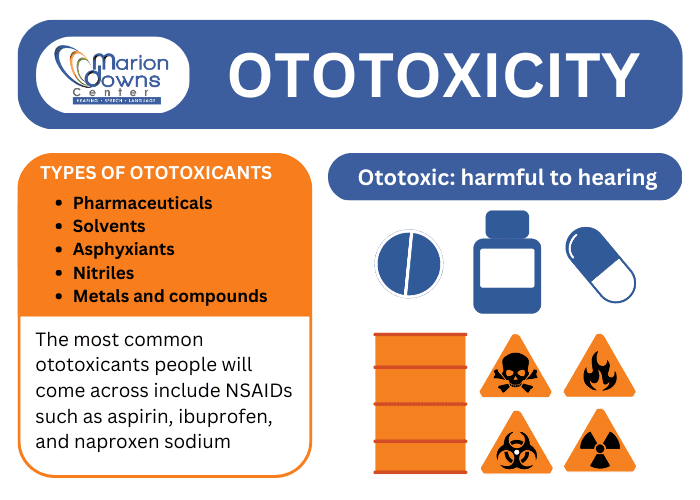Otoxicity & Hearing Loss

Ototoxicity refers to “ear poison” and can cause hearing loss, tinnitus, and/or related balance disorders. According to the U.S. Occupational Safety and Health Administration (OSHA), there are five main categories of ototoxicants:
- Pharmaceuticals, such as loop diuretics, selected analgesics, some chemotherapy medications, and certain antibiotics
- Solvents, such as toluene, ethylbenzene, and trichloroethylene
- Asphyxiants, such as carbon monoxide, hydrogen cyanide, and tobacco smoke
- Nitriles, such as 3-butenenitrile, cis-2-pentenenitrile, and acrylonitrile
- Metals and compounds, such as mercury compounds, germanium dioxide, and lead
The most common ototoxicant you’re likely to come across are nonsteroidal anti-inflammatory drugs (NSAIDS) including aspirin (Bayer, Bufferin), ibuprofen (Advil, Motrin), and naproxen sodium (Aleve).
Nystagmus (involuntary eye movement), fatigue, headaches, nausea, and vertigo can be symptoms of ototoxicty. Tinnitus may appear first before hearing loss develops.
There is no standard treatment for ototoxicty and prevention is key. Hearing and balance MAY return once ototoxicants are out of an individual’s system. In the case of permanent hearing loss, hearing aids and auditory rehabilitation strategies can improve an individual’s quality of life. Our audiologists can help you explore options.
Ototoxicity is a common cause of hearing loss so individuals can be proactive about their hearing health. If you or a loved one are taking ototoxic medication or think you may be experiencing ototoxicity symptoms, make an appointment with the Marion Downs Center for a hearing evaluation.
